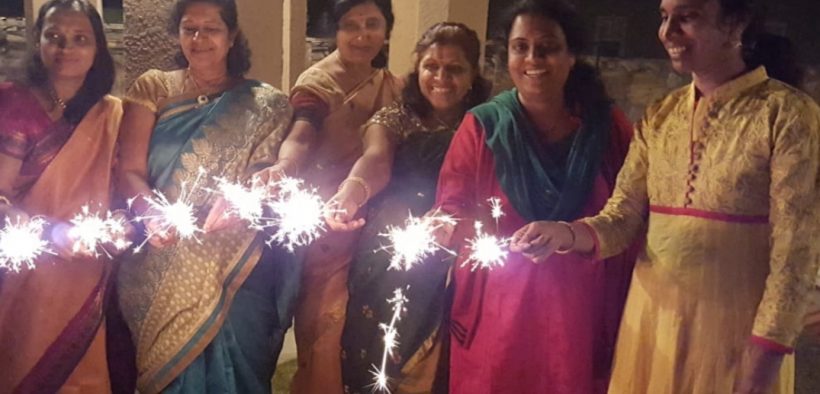Remove your shoes, open the door, ring the bell three times and walk toward the altar to pray. That’s what Hindu devotees do every time they enter the Southwest Hindu Temple on El Paso’s West Side.
Colorful lights hang on the altar. India’s flag is on the right side and the U.S flag on the left. In the center of the temple is a brass tray “puja thali” with rice, turmeric, chandan and incense.
The Southwest Hindu Temple is an essential place for El Paso’s Indian community to preserve their religion and traditions. The temple first opened in 2007 but sits empty today because of the COVID-19 pandemic. The faithful must make an appointment to come in and can only stay for 15 minutes.
The temple’s priest, Rounur Venugopal, was born and raised in Bangalore, Karnataka, India. He came to El Paso in 2008 on a visa for religious workers. His wife and son joined him two years later.
“It was very different to move here first, but it is OK now. The people of this town are friendly and I enjoy serving as a priest for my community,” Venugopal said.

In El Paso, members of the Asian Indian community say they have found a place to call home because of the thriving job market in education, health and technical sectors; educational opportunities; and the warm weather similar to their country.
According to the Migration Policy Institute, as of 2019, about 2.7 million Asian Indian immigrants reside in the United States. There is not a precise estimate on the number of people from India living in El Paso. The U.S. Census Bureau says people of Asian descent, which includes Indians, represent about 1.4% of the El Paso population, or about 12,000 people.
While many El Pasoans leave town looking for better wages, many Indians move into the city because of the work opportunities. UTEP and Texas Tech University Health Sciences Center are two hubs for hiring professionals and enrolling students from India.
Chintalapa Ramana is an associate professor of mechanical engineering and director of the Center for Advanced Materials Research at the University of Texas at El Paso and serves as the chairman of the board of trustees at the Southwest Hindu Temple. He and his family moved from Michigan to El Paso in 2008. Ramana came in 2002 to the United States to pursue his Ph.D.
“I have lived in many cities in the U.S. before moving to El Paso, but this is a great place to live. The community is very friendly with us, we feel safe and I was fortunate to come to work at UTEP,” Ramana said.
Higher education draws Indians to El Paso
Indians say they feel welcomed by the Hispanic population and think they have much to share regarding food and culture.
“We eat a lot of rice, Mexican people too. We love spicy food, they do too. We cook with many spices and Mexicans do the same. I think we have a lot in common, and we like to do big gatherings and potlucks; they do too,” Ramana said.

Arvind Singhal was born and raised in Rourkela, India, and is a UTEP professor of communication. Singhal came to the United States in 1983 to pursue his master’s degree. After 17 years living in Ohio, he and his family moved to El Paso.
“The bilingual experience, to experience the unique attributes of the university and the environment of the border, and the job offer from UTEP were among the top factors for us to move here,” Singhal said.
Pratyusha Basu is an associate professor of geography and director of Asian Studies at UTEP. Basu was born in Lucknow, India. Her father was part of the military and they continuously moved all around India. She arrived in El Paso in 2015 after she and her husband accepted job offers from the university.
Previously they lived in Florida. Basu came to the United States in 1995 to pursue her Ph.D.
“It was one of those moments when everyone was coming to the U.S for education. I was part of that boom. A lot of students from India were coming here to complete their education,” Basu said.
A grocery store anchors a community
For Basu and Singhal, the accessibility to products from their home country is a plus that they did not expect to find in El Paso.
When Basu lived in other cities across the country, it was frustrating for her not to find Indian products. But when she moved to El Paso and found the RV International Grocery store, it gave her a sense of the importance of the Indian community in El Paso.
“Access to the food that you need is very important because that is the place to gather. You can keep your community alive if you have access to their traditional food,” Basu said.

RV International Grocery sells primarily products from Asia, especially Indian goodies. The shelves are full of colorful products with tags written in different languages. At the entrance, it is hard to miss the giant posters of Indian Bollywood actors.
RV is where Indians can find the ingredients to cook their favorite meals and where they can socialize and meet others who might be new to town.
Venugopal’s son works as a cashier at RV. Sheshashayee Venugopal is a junior business management student at UTEP. He came to the United States when he was 12.
“Oh yes, everyone who is new in town, they come here and they start making friends. You know, India is a big country, but even sometimes people find here someone from their state or city,” Sheshashayee said.

RV is in a shopping center at 4700 North Mesa St., a couple of miles from UTEP. The owner declined to be interviewed by El Paso Matters but allowed interviews and photographs in the store.
Another place to meet people from India is the Indian Student Association at UTEP, which has around 25 members this spring semester. Jeevarathinam Senthilkumar, 20, is the current president. He is pursuing his master of science in engineering. He came to El Paso in 2018.
Senthilkumar found out about UTEP through a friend in India. He was excited to come to a place where people from his hometown had finished their education. He knew he could make this place his home.
“I feel comfortable in El Paso, the temperature is similar to my hometown, and people are very friendly to us,” Senthilkumar said.
COVID-19 impact
Like any other community, Indian society has adapted to the COVID-19 restrictions. At the beginning of the pandemic, Venugopal and a few temple members conducted a “Havan.” According to Venugopal, this is a fire ritual performed by a Hindu priest to purify the air and bring peace to the environment.
But as COVID-19 cases exploded in El Paso during October and November, Diwali was canceled. Diwali is one of the most important festivals for the Indian community. It takes place between October and November. El Paso’s Indian community usually celebrates Diwali at Southwest Hindu Temple with a big potluck.
“The toughest was not to celebrate Diwali, I have no words to express how I feel about it. It was devastating for me, my family and the community,” Ramana said.

Pandemic travel restrictions also made it impossible for most Indians in El Paso to return to their native country to visit family.
“Because of the pandemic, I haven’t been able to go to India for a whole year. My parents are old, having to reconcile with the fact that I might not be able to see them,” Basu said. “I finally realize what it means to be an immigrant. The pandemic showed me that, not being able to travel.”
Singhal used to travel four times a year to India. Last year, in March, he was set to travel for spring break, just as the pandemic hit. He initially postponed the trip, then canceled his travel plans.
“That is the toughest part of living far from home because my parents are old, but we had to adapt,” Singhal said. “I used to speak once or twice a week with my mom, but now we speak twice a day, so maybe this could not happen if it was because of COVID.”

Singhal’s family decided to cook a big traditional dish once a week and delivered it to other Indian families to keep the community together in challenging times while practicing social distancing. Others did the same.
“I decided to cook something in a big batch, and I break it into small boxes and deliver them to my friend’s home. I text them that I am coming, and if they are home, they open the door, we wear masks and stand 10 feet away and talk for about 10 to 15 minutes,” Singhal said.
When looking for ideas to stay connected during the pandemic, the Indian Student Association moved their meetings online. They keep in touch through Whatsapp.
“You know, many students don’t have a car, and now it is important to have one to go and get your groceries. In the group chat, we help each other with her groceries, so they feel safer,” Senthilkumar said.
Cover photo: Members of El Paso’s Indian community celebrated the festival of Diwali in 2019. The traditional celebration didn’t take place in 2020 because of the pandemic. (Photo courtesy of the Southwest Hindu Temple)
This article first appeared on El Paso Matters and is republished here under a Creative Commons license.” data-src=”https://elpasomatters.org/?republication-pixel=true&post=8916&ga=UA-158587614-1″ />


